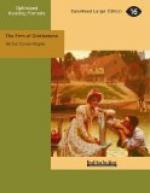The small window of her apartment was covered by a dirty muslin blind. She rose and, drawing it aside, looked eagerly out. From what she had seen the night before she had hoped that this prison to which she had been conveyed might make amends for its loneliness by some degree of natural beauty. The scene which now met her eyes soon dispelled any expectations of the sort. The avenue with its trees lay on the other side of the house. From her window nothing was visible but a dreary expanse of bog-land and mudbanks stretching down to the sea. At high tide this enormous waste of dreariness and filth was covered by the water, but at present it lay before her in all its naked hideousness, the very type of dullness and desolation. Here and there a few scattered reeds, or an unhealthy greenish scum upon the mud, gave a touch of colour to the scene; but for the most part the great plain was all of the same sombre mud tint, with its monotony broken only by the white flecks where the swarms of gulls and kittiwakes had settled in the hope of picking up whatever had been left by the receding tide. Away across the broad surface a line of sparkling foam marked the fringe of the ocean, which stretched away to the horizon.
A mile or two to the eastward of her Kate saw some sign of houses, and a blue smoke which flickered up into the air. This she guessed to be the fishing village of Lea Claxton, which the driver had mentioned the night before. She felt, as she gazed at the little hamlet and the masts of the boats in front of it, that she was not alone in the world, and that even in this strange and desolate place there were honest hearts to whom as a last resource she could appeal.
She was still standing at the window when there came a knocking at the door, and she heard the voice of the old woman asking if she were awake. “Breakfast is ready,” she said, “and the master is a-wondering why you bean’t down.”
On this summons Kate hastened her toilet and made her way down the old winding stair to the room in which they had supped the night before. Surely Girdlestone must have had a heart of flint not to be melted by the sight of that fair, fresh face. His features set as hard as adamant as she entered the room, and he looked at her with eyes which were puckered and angry.
“You are late,” he said coldly. “You must remember that you are not in Eccleston Square. ‘An idle soul shall suffer hunger,’ says the prophet. You are here to be disciplined, and disciplined you shall be.”
“I am sorry,” she answered. “I think that I must have been tired by our journey.”
The vast room looked even more comfortless and bleak than on the preceding evening. On the table was a plate of ham and eggs. John Girdlestone served out a portion, and pushed it in her direction. She sat down on one of the rough wooden chairs and ate listlessly, wondering how all this was going to end.




